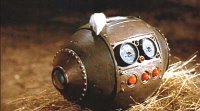

Alguém se lembra deste filme do excelente Peter Sellers? É uma comédia deliciosa sobre um "paiseco" falido que resolveu provocar os EUA para serem inexoravelmente derrotados e... anexados! O plano deu errado e eles venceram, digamos assim, a guerra. É uma sátira perfeita para Banânia, só que deveríamos torcer para que o "engenhoso" plano não desse errado. Após alguns anos de trapalhadas políticas e tentativas de virar nação, Banânia deveria se render à evidência de seu destino lamentável (remember Roberto Campos: "A ignorância no Brasil tem um passado glorioso e um futuro promissor") e virar estado de algum país do primeiro mundo. O problema é que a coisa está caminhando mais para ser porão de republiqueta latrino-americana...
"Also a political satire, The Mouse That Roared underscores Kubrick's potent critique of the world's dangerous nuclear game. Although made five years earlier at the same Shepperton Studios in England, The Mouse That Roared has many ingredients identical to Strangelove's -- Sellers in three corresponding roles (the bumbling queen, the conscientious soldier, the conniving politician), a nuclear threat, war, and political manipulation. But Jack Arnold's film is also very different, in its unfailing light heart. While it encourages you to chew over the same ideas, the taste is distinctively sweeter.
Consider the gentle Tully Bascomb (Sellers), a soldier from Mouse's fictional European backwater burg, Grand Fenwick. Fenwick has one export, wine, whose value is significantly downgraded when a California winery puts out a copycat product. And so, Fenwick declares war on the United States. That design is the brainchild of the devious Count Mountjoy (Sellers again) and the Grand Duchess Gloriana (who else? Sellers), who figure that after a swift defeat, Grand Fenwick will begin to cash in the type of reconstruction that built Europe back up after WWII. Like Sellers' Mandrake in Strangelove, Bascomb is the peacenik innocent who gets caught up in a ludicrous geopolitical nightmare.
But Bascomb is no dummy. Put in charge of a ragtag army of 30 or so to invade America by tugboat (on which he can't keep from vomiting, being the seasick type), he seizes the initiative in a war doomed to fail. By the time the soldiers, armed with nothing but arrows, arrive in New York (rendered utterly silent by an air raid drill), Bascomb has become -- like Mandrake, Gump, and Chance -- the right guy in the right place at the right time. He lucks into finding the Einstein-like nuclear physicist, Professor Kokintz (David Kossof), whose construction of a fictional Q bomb (think Strangelove's Doomsday device) is the reason all of Gotham is huddled underground. He also falls in love at first sight with Kokintz's daughter Helen (Jean Seberg), before spiriting both away, with Q bomb in hand, back to Grand Fenwick.
The fact that access to New York is exceedingly easy or that the most dangerous nuclear device in the world is merely sitting on a desk in its creator's office is irrelevant to this relaxed film (though it's still annoying for some viewers, this one included). What matters is that Bascomb serendipitously lands in the bomb's neighborhood to salvage his Quixotic mission and restore glory to his nation. Even when the military spots Bascomb's countrified regiment, they're convinced (in a sure reference to pre-Cuban Missile Crisis Cold War hysteria) that the Fenwick band is from outer space. Within seconds, the rumors are flying and New Yorkers believe they're under alien invasion.
On its surface, Mouse conflates alien takeovers, nuclear holocaust, political machinations, and hyped up military conflict as much as any other Red Menace film of the period. But unlike those films -- and unlike Kubrick's Strangelove, which sets off the Doomsday explosion at the end -- Mouse is actually a comedy, not just a laughable exercise in paranoia. And so its parody, conspiracy, and madness only form the backdrop for a sweet love story, as well as another tour de force for Sellers' comic gifts. (It's Austin Powers without the bathroom humor.) The Q bomb is merely a means to bring Bascomb and Helen together, punish Mountjoy for his lunacy, and make the audience feel safe at home. Because of that, the film's satirical thrust is dampened considerably. (...)"
Imagens: cenas de The mouse that roared. (AQUI, um site interessante sobre o filme). Acima, a bomba Q. Não é lindinha? Embaixo, Peter Sellers, em um de seus três hilários papéis.
Marx, o Groucho
No comments:
Post a Comment